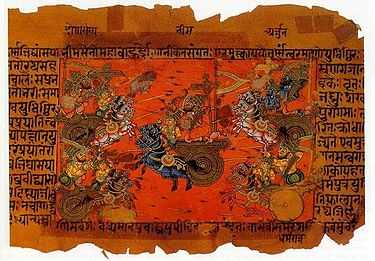Kunti
| Kunti | |
|---|---|
 Kunti along with her husband Pandu | |
| Spouse(s) | Pandu |
| Children | Karna, Yudhisthira, Bhima, Arjuna |
| Parent(s) | |
In Hindu mythology, Kunti (Sanskrit: कुंती Kuntī) also called Pritha, was the biological daughter of Shurasena,[1] the sister of Vasudeva, the foster daughter of her cousin King Kunti-Bhoja,[2] the wife of King Pandu[3] of Hastinapur and the mother of Karna,and King Yudhisthira of Indraprastha.[4]
Before Kunti married Pandu,[5] she bore Karna to Surya, the solar deity. Afraid of being an unwed mother, she placed the baby in a basket and set him afloat on a river. This child was later found and adopted by a chariot driver and his wife, and was named Karna. He went on to become a central character in the Mahabharata. The ambiguous emotions Karna felt about his birth mother play an important role in the Mahabharata. She later married Pandu and bore Yudhisthira,[6] Bhima[7] and Arjuna.
Her story is told within the Bhagavata Purana, wherein she speaks on the philosophy of devotion to her nephew Krishna,[8] known as Bhakti yoga.
After the death of her husband, Kunti did not commit sati, but his other wife Madri did. Kunti took care of Nakula and Sahadeva, the sons of Madri, as her own sons.
Kunti also went into hiding with her sons after Duryodhana ,Shakuni & her own son Karna tried to kill them all by burning them in Lakshagrah Kunti prevented Bhima from killing the demoness Hidimba and advises him to marry her and beget Ghatotkacha. She instructed her children to take care of the common people and ordered Bhima to kill the demon Bakasura.
Kunti perished in a forest fire in the Himalayas with her brother-in-law King Dhritarashtra and his wife Gandhari and attained heaven.[9][10]
References
- ↑ Studies of Mahabharata
- ↑ KUNTI (also called Pritha and Parshni)
- ↑ A classical dictionary of Hindu mythology and religion, geography, history, and literature by Dowson, John (1820-1881)
- ↑ Mahabharata
- ↑ Encyclopaedic Dictionary of Purāṇas by Swami Parmeshwaranand
- ↑ A story showing the greatness of Kunti
- ↑ Kapoor, edited by Subodh (2002). The Indian encyclopaedia: biographical, historical, religious, administrative, ethnological, commercial and scientific (1st ed. ed.). New Delhi: Cosmo Publications. Page 7535.
- ↑ Krishna, the ultimate idol: [a provocative analysis of Krishna's life and mission] by Girīśa Pa Jākhoṭiyā
- ↑ "Kunti" (pdf). Manushi India Organization. Retrieved 10 January 2013.
- ↑ Mani pp.442-3
External links
| Wikiquote has quotations related to: Kunti |
| |||||||||||||||||||||||||
